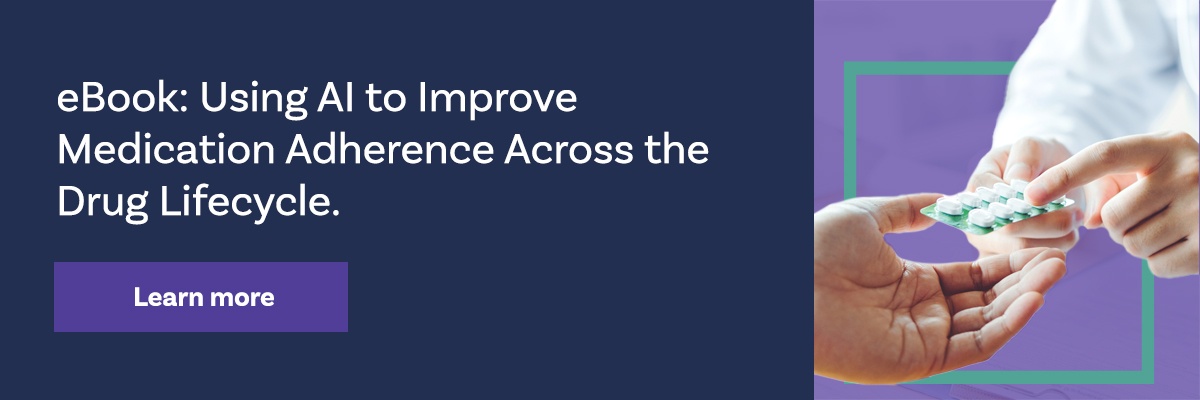Nearly all pharmaceutical companies build and launch patient support programs to improve therapy initiation and medication adherence. Patient support is essential for helping optimize medication use and increasing engagement with patient-centered initiatives.
Offering artificial intelligence (AI)-powered support services throughout the patient journey can deliver more targeted outreach, reduce healthcare spending, and improve outcomes. Similarly, AI is applicable across all types of programs regardless of the therapeutic area or condition.
Let’s look at how to implement AI across all stages of the drug lifecycle.

Why Are Leading Pharmaceutical Companies Using AI?
Innovative technologies such as AI enable pharmaceutical companies to optimize medication adherence programs and tailor patient engagement to each individual’s unique needs. Combining data about a patient’s medical and social status can enable companies to take an individualized, patient-centered approach that is more effective and cost-efficient than traditional programs. It also provides a holistic perspective of the whole patient, including medical and social factors, to enable better treatment and patient engagement.
AI-powered predictions are made using varied, robust data on consumer behaviors, historical program engagement, pharmacy and medical claims, and social determinants of health (SDOH). By aggregating this data, AI catches patients at-risk of falling through and the optimal way to intervene at the individual level. Additionally, AI recommends the best channel, messaging, timing, and cadence for each patient to optimize and improve the effectiveness of existing patient support initiatives.
Implementing AI Across Every Stage of the Drug Lifecycle
It’s never too early or late in a drug’s lifecycle to use AI. Pharma companies can implement AI at any point during the drug lifecycle, from pre-launch to post-launch.
Pre-Launch
This is a busy time in the drug lifecycle, in which pharma companies are focused on factors such as regulatory compliance and drug indications. However, patient support still needs to be considered to ensure medication initiation and adherence after launch. AI can be incorporated during this time to prepare for optimized, individualized patient support during the launch and post-launch phases.
At Launch
During launch, incorporate AI to build a complete picture of what’s working and what’s not from the beginning. This information will help evolve patient support programs over time and ensure the best patient experience and program impact. AI can help brand leaders get ahead of potential issues by proactively identifying and addressing process gaps that can lead to poor therapy initiation or non-adherence.
Post-Launch
After launching, pharma companies can use AI to not only monitor patients’ medication use and adherence, but also intervene when necessary for better medication adherence. AI can also be used during this stage to provide tailored patient support to keep patients on therapy. Recommendations can be provided on the best channel, messaging, timing, and cadence to improve medication adherence and ensure patients stay on their treatment plan.
Patient support programs powered by AI can also improve competitive positioning in formularies, especially when generics and similar medications come to market. These programs are also helpful for clinicians and prescribers. With these programs in place, clinicians are better able to serve patients and prescribers have the support they need to keep the patient adherent to their medications.
AI-powered programs can also drive better utilization as new drug indications are approved and incorporated into patient support programs. Providing a tailored support program to patients can show providers that a pharma company is committed to services that result in positive outcomes, which may help keep patients adherent to therapy. These programs are beneficial for the patient journey as well as the drug lifecycle.
Interested in an AI-Powered Patient Support Program?
It’s never too early or too late to implement AI into a drug lifecycle. An AI-powered patient support program is beneficial from pre-launch through post-launch. The benefits of using AI are significant, whether it is used to prepare an optimized, tailored patient support program for an upcoming launch, proactively ensure medication adherence programs are set up for success, or monitor prescribed patients’ medication adherence.
